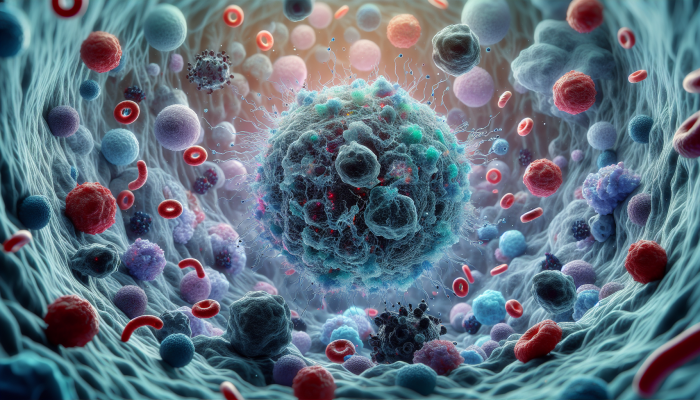In-Depth Analysis of the Essential Role of Cancer Marker Testing in Modern Healthcare
Understanding the importance of cancer marker tests is vital for patients and medical professionals alike. These tests function as critical diagnostic tools within the healthcare system, providing essential insights into the detection and advancement of various types of cancers. By analyzing specific substances in the body that may signal the existence of cancer, these evaluations are instrumental in the early identification and continuous management of the illness. This proactive strategy ultimately leads to better patient outcomes, as early interventions can significantly affect treatment options and enhance survival rates.
Unpacking the Mechanisms of Cancer Marker Functionality in Diagnostics

Cancer markers, often referred to as tumor markers, are unique substances produced either by cancerous cells or by the body in response to the presence of cancer. These markers can be identified in blood, urine, or tissue samples, and their presence can be associated with specific types of cancer. The main role of cancer markers is to assist in diagnosis and enable ongoing monitoring of cancer, empowering healthcare providers to make informed treatment choices. While they are not conclusive for diagnosing cancer, higher levels of these markers may necessitate further testing, including imaging studies or biopsies, to confirm the diagnosis.
Furthermore, cancer markers play a crucial role in assessing treatment efficacy. A reduction in marker levels after treatment may indicate that the therapy is effective, whereas an increase could suggest a recurrence of the disease or resistance to the current treatment protocol. Therefore, the relevance of cancer marker tests extends beyond simple detection; it encompasses ongoing evaluations of a patient’s health status and their reactions to different treatment modalities.
Diving into the Various Categories of Cancer Markers and Their Significance
There are several distinct types of cancer markers, each serving unique purposes in diagnostics and treatment planning. The most commonly recognized categories include:
1. Protein Markers: These are some of the most well-known cancer markers. For instance, proteins such as prostate-specific antigen (PSA) are indicative of prostate cancer, while CA-125 is typically linked to ovarian cancer. Regular monitoring of elevated protein levels is a standard practice during treatment to evaluate progress.
2. Genetic Markers: The role of genetic markers in cancer diagnostics is gaining importance. Variations in specific genes, such as BRCA1 and BRCA2, can heighten the risk for breast and ovarian cancers. Testing for these genetic markers allows for informed risk assessments and the creation of tailored preventive strategies for individual patients.
3. Hormonal Markers: Certain hormones can also serve as valuable markers. For example, elevated levels of human chorionic gonadotropin (hCG) may indicate testicular cancer. Monitoring hormone levels is crucial for diagnosing and managing specific types of cancers, providing essential insights into the disease’s progression.
A thorough comprehension of the diverse types of cancer markers is essential for both patients and healthcare providers, as these markers greatly enhance personalized treatment approaches and contribute to improved patient results.
Understanding the Critical Importance of Cancer Marker Testing in Patient Care
The significance of Cancer marker tests cannot be emphasized enough. Early detection of cancer significantly boosts the chances of successful treatment and improves patient survival rates. By identifying cancer at its earliest stages, healthcare professionals can initiate timely interventions, which can lead to less aggressive treatments and more favorable patient outcomes.
Moreover, these tests are essential for gauging the effectiveness of ongoing therapies. A patient’s response to treatment can often be determined by observing changes in marker levels, which provides crucial feedback on whether to maintain, adjust, or change the treatment plan entirely.
Additionally, cancer marker tests promote a more individualized approach to healthcare. The insights gained from these tests enable healthcare providers to tailor treatment plans based on the unique biological characteristics of each patient’s cancer. This personalized strategy not only enhances the likelihood of successful treatment outcomes but also minimizes the unnecessary side effects associated with ineffective therapies.
In summary, recognizing the importance of cancer marker tests and their implications is essential for effective cancer management. This knowledge equips both patients and healthcare professionals with the necessary tools to make informed decisions regarding care and treatment.
Deciphering the Mechanisms Behind Cancer Marker Tests for Accurate Diagnoses

The mechanisms underlying cancer marker tests are fundamentally grounded in biological specificity and the body’s responses to cancerous cells. These tests are meticulously created to identify and measure substances associated with cancer, providing essential insights that guide diagnosis and treatment alternatives.
Examining the Biological Basis of Cancer Marker Detection
The detection of cancer markers is predicated on the biological changes that occur when cancer cells are present. Cancer cells frequently produce proteins or other substances in abnormal amounts, leading to increased concentrations of these markers in blood or other bodily fluids. For instance, the proliferation of tumor cells may result in the release of proteins such as CA-19-9, which can be detected through blood tests.
Additionally, the body’s immune response to cancer plays a pivotal role. The presence of cancer can stimulate the production of specific antibodies, which can also serve as markers for the disease. Grasping these biological mechanisms is crucial for developing effective diagnostic tests capable of accurately identifying cancer.
Research in this field is continuously evolving, with scientists exploring new markers and refining detection methodologies. This ongoing research enhances the reliability and accuracy of cancer marker tests, paving the way for improved patient outcomes through timely and precise interventions.
Key Techniques for Conducting Effective Cancer Marker Testing
Multiple widely used techniques for testing cancer markers each offer distinct advantages:
1. Blood Tests: The most common approach to cancer marker testing involves the analysis of blood samples. These tests assess levels of specific proteins or substances that may indicate the presence of cancer. For example, a simple blood draw can provide critical information regarding PSA levels during prostate cancer screenings.
2. Urine Tests: Certain cancer markers can also be identified in urine samples. Tests for markers such as NMP22, associated with bladder cancer, offer a non-invasive alternative for monitoring and diagnosing cancer, which is particularly appealing to many patients.
3. Tissue Biopsies: In certain situations, obtaining a tissue sample may be essential to assess cancer markers directly from the tumor. This method provides more definitive information regarding the type of cancer and its specific characteristics, thereby effectively guiding treatment decisions.
4. Imaging Techniques: While not a direct method for measuring markers, imaging technologies like PET scans can visualize tumors and indirectly assess changes in marker levels, contributing to a comprehensive evaluation of cancer.
Each of these methodologies is crucial for the holistic assessment of cancer, enabling healthcare providers to select the most suitable testing strategy based on individual patient needs and circumstances.
Assessing the Reliability and Limitations of Cancer Marker Tests

While cancer marker tests are invaluable components of the diagnostic toolkit, they are not without limitations. A significant concern relates to their accuracy. Both false positives and negatives can occur, leading to misinterpretation of results. For instance, elevated CA-125 levels might arise from conditions unrelated to cancer, such as endometriosis or pelvic inflammatory disease, potentially causing unnecessary anxiety or invasive procedures.
Factors like age, gender, and pre-existing health conditions can also affect marker levels, complicating result interpretation. Consequently, healthcare providers must consider the broader clinical context when evaluating the outcomes of these tests to avoid misdiagnosis.
Moreover, not all cancers produce detectable markers, and some markers may not elevate until the cancer has reached a more advanced stage. This limitation underscores the necessity of utilizing cancer marker tests alongside other diagnostic methods, such as imaging and biopsies, to ensure a thorough evaluation.
In summary, while cancer marker tests are powerful tools for early detection and ongoing monitoring, understanding their accuracy and limitations is crucial for effective cancer management. An informed approach that considers each patient’s unique circumstances will lead to optimal clinical outcomes.
Interpreting Cancer Marker Test Results for Effective Patient Care
The interpretation of results from cancer marker tests represents a critical phase in the continuum of cancer management. Both patients and healthcare providers must navigate the complexities of these results to make well-informed decisions regarding diagnosis and treatment strategies.
Understanding the Significance of Test Results
Upon receiving results from a cancer marker test, it is vital to comprehend the implications of these figures. Each marker possesses defined normal and abnormal ranges, which can vary based on factors such as age, sex, and overall health. For instance, elevated PSA levels in men may indicate prostate cancer but can also increase due to benign conditions like prostatitis.
Healthcare professionals typically rely on these established ranges to accurately interpret results. An increase in marker levels from previous assessments can be particularly concerning, potentially indicating disease progression or recurrence. Therefore, it is imperative for patients to maintain open communication with their healthcare teams to fully understand their results and the implications for their treatment plans.
Factors Influencing Cancer Marker Levels in the Body
Numerous factors can impact the levels of cancer markers in the body, with age being one of the most significant. Certain markers naturally rise as individuals grow older. Moreover, gender-specific differences can influence marker levels, as some markers are exclusive to male or female cancers.
Lifestyle choices—including diet, exercise routines, and smoking habits—can also affect marker levels. For example, obesity has been linked to increased levels of specific cancer markers, while healthier dietary decisions may help stabilize these levels. Recognizing these influencing factors is essential for accurate interpretation and may guide lifestyle changes to enhance overall health.
It is equally important to understand that fluctuations in marker levels may occur due to factors unrelated to cancer. Conditions such as inflammation, infections, and other non-cancerous ailments can also elevate marker levels, potentially leading to misinterpretation. Thus, a comprehensive assessment of all influencing factors is vital for precise diagnosis and effective management.
Taking Proactive Steps After Test Results
Once results from a cancer marker test are available, patients should take proactive measures in their care journey. If results indicate elevated marker levels, further diagnostic evaluations may be necessary. This could involve imaging studies, biopsies, or additional blood tests to either confirm the existence of cancer or to rule out alternative conditions.
Maintaining open communication with healthcare providers is equally crucial. Following up with thorough discussions about the results, possible next steps, and treatment options is fundamental. Patients should feel empowered to ask questions and express any concerns they have regarding their health.
In certain instances, monitoring may be the recommended course of action. If marker levels are only slightly elevated or fluctuating, healthcare providers may suggest routine testing to track changes over time instead of pursuing immediate intervention. This strategy ensures that significant changes are detected early, allowing for prompt action.
Ultimately, learning how to navigate the aftermath of cancer marker tests is essential for effective cancer management. With appropriate support and information, patients can take charge of their health and make informed decisions regarding their treatment.
The Integral Role of Cancer Marker Tests in Clinical Practice
The integration of cancer marker tests into clinical practice has transformed how healthcare professionals approach cancer screening, diagnosis, and treatment planning. These tests serve a multifaceted role in enhancing patient care and facilitating the customization of treatment strategies.
Revolutionizing Cancer Screening and Early Detection Approaches
One of the most substantial advantages of cancer marker tests is their contribution to cancer screening and early detection. These tests often reveal the presence of cancer before symptoms arise, allowing for timely intervention. For example, routine PSA testing in males can lead to the early identification of prostate cancer, significantly improving treatment outcomes.
In addition to individual testing, cancer marker tests are frequently integrated into population-based screening initiatives. These programs aim to identify individuals at risk and promote early detection efforts. For instance, women with a family history of breast cancer may undergo testing for BRCA mutations, which can lead to proactive monitoring or preventive measures.
The effectiveness of early detection supported by cancer marker tests emphasizes the necessity of regular screenings and proactive health management. Patients should engage in discussions with their healthcare providers about suitable screening strategies tailored to their unique risk factors.
Monitoring Treatment Effectiveness and Tracking Disease Progression
In the context of treatment, cancer marker tests are invaluable for monitoring patient responses and tracking disease progression. As treatment proceeds, healthcare providers can observe changes in marker levels to assess how well the patient is responding. A decrease in marker levels usually suggests effective treatment, while an increase may warrant adjustments to the treatment plan.
For example, in colorectal cancer, measuring CEA (carcinoembryonic antigen) levels provides insights into treatment success. Regular monitoring allows for dynamic adjustments to therapy, ensuring that patients receive the most appropriate treatment based on their evolving health status.
Additionally, cancer marker tests can facilitate the early detection of recurrences, enabling timely interventions. By maintaining vigilance through ongoing testing, healthcare providers can significantly enhance patient outcomes and ensure comprehensive care.
Enhancing Personalized Medicine with Cancer Marker Tests
The emergence of personalized medicine has transformed cancer treatment, and cancer marker tests are central to this evolution. By analyzing specific markers associated with an individual’s cancer, healthcare professionals can devise tailored treatment plans that address the unique biological characteristics of the tumor.
This personalized approach may involve selecting targeted therapies that are more likely to be effective based on the particular markers present in a patient’s cancer. For instance, patients with specific mutations in the EGFR gene can benefit from targeted treatments that specifically address these mutations, resulting in improved outcomes compared to traditional therapies.
Moreover, cancer marker tests can inform decisions about immunotherapy, hormone therapy, and chemotherapy, leading to a more individualized treatment experience. This emphasis on personalized medicine not only heightens the chances of successful treatment but also reduces unwanted side effects from therapies that may not be effective for the patient.
In summary, the application of cancer marker tests in clinical practice is vital for advancing cancer care. Through their roles in screening, monitoring, and personalized treatment, these tests empower both patients and healthcare providers to effectively navigate the complexities of cancer management.
Emerging Innovations and Future Directions in Cancer Marker Testing
As the field of oncology continues to advance, so too do the methodologies and technologies surrounding cancer marker tests. Emerging trends in research, technology, and data analysis are set to enhance the effectiveness and accessibility of these tests, shaping the future landscape of cancer diagnostics and treatments.
Recent Breakthroughs in Cancer Marker Research
Recent advancements in cancer marker research have led to the discovery of new markers and improved testing methodologies. Researchers are continually exploring novel biological pathways and substances associated with various cancers, thereby expanding the range of detectable markers. For instance, the identification of circulating tumor DNA (ctDNA) has opened up new avenues for non-invasive testing and monitoring of cancer.
Furthermore, the integration of genomics and proteomics into cancer marker research provides a more thorough understanding of tumor biology. By examining the genetic and protein expressions linked to specific cancers, researchers can develop more precise and effective testing methods.
As this research progresses, we anticipate the emergence of even more sophisticated and sensitive cancer marker tests that will offer deeper insights into disease mechanisms and individual patient responses. Such advancements will ultimately enhance diagnostic capabilities and improve patient outcomes.
The Role of Liquid Biopsies and Non-Invasive Testing Techniques
Liquid biopsies represent a groundbreaking development in the realm of cancer marker tests. These non-invasive assessments analyze circulating tumor cells, ctDNA, or exosomes found in the bloodstream, enabling real-time monitoring of cancer without the invasive procedures typically associated with traditional biopsies. This method is especially beneficial for patients with metastatic disease, as it facilitates continuous evaluation of tumor dynamics.
Liquid biopsies have the potential to transform cancer diagnostics by providing a broader perspective on tumor heterogeneity and evolution. Moreover, they enable early detection of recurrences, allowing for quick interventions that can significantly enhance patient outcomes.
As technology continues to advance, the accuracy and reliability of liquid biopsies are expected to improve, establishing them as an integral tool in the ongoing management of cancer. The convenience and minimal invasiveness associated with these tests will likely lead to greater acceptance in clinical settings.
Improving Cancer Marker Testing Through Artificial Intelligence and Machine Learning
The integration of artificial intelligence (AI) and machine learning into the analysis of cancer marker tests represents another exciting trend poised to influence the future of oncology. These technologies can process extensive datasets, identifying patterns and correlations that may not be readily apparent to human analysts. AI algorithms can enhance the accuracy of test interpretations, reducing the likelihood of false positives and negatives.
Machine learning can also aid in developing predictive models that estimate patient outcomes based on specific marker profiles. By analyzing historical data, these models can inform treatment decisions and prognostic assessments, resulting in a more personalized approach to cancer care.
As AI technologies continue to evolve, their application within the field of cancer marker tests is expected to expand, further improving the precision and effectiveness of cancer diagnostics and treatment strategies.
In conclusion, the future of cancer marker testing appears promising, with emerging trends in research, technology, and data analysis poised to revolutionize the cancer care landscape. These advancements will empower both patients and healthcare providers, leading to improved detection, monitoring, and treatment outcomes.
Frequently Asked Questions About Cancer Marker Tests
Can Cancer Marker Tests Detect All Types of Cancer?
Cancer marker tests are not capable of identifying every type of cancer. They are specific to certain cancers and may not be effective for others. Healthcare providers generally use them alongside additional diagnostic methods for a comprehensive evaluation.
How Often Should Cancer Marker Tests Be Conducted?
The frequency of cancer marker tests is determined by individual risk factors, the specific type of cancer, and a patient’s treatment history. Patients should consult their healthcare teams to establish an appropriate testing schedule.
Is Insurance Coverage Available for Cancer Marker Tests?
Insurance coverage for cancer marker tests differs based on the specific test and the patient’s insurance plan. Patients are encouraged to review their coverage options with their insurance providers and discuss these with their healthcare teams.
What Should I Expect if My Cancer Marker Levels Are Elevated?
Elevated cancer marker levels may suggest the presence of cancer, but further testing is usually required for a definitive diagnosis. Healthcare providers generally recommend additional tests or imaging to clarify the situation.
Can Lifestyle Changes Influence Cancer Marker Levels?
Absolutely, lifestyle modifications such as improved nutrition, increased physical activity, and smoking cessation can affect cancer marker levels. Adopting a healthier lifestyle may help normalize these markers and enhance overall health.
Do All Types of Cancer Produce Detectable Markers?
Not all cancers generate identifiable markers. Some cancers may not show elevated marker levels until they have progressed significantly. Therefore, additional diagnostic methods are frequently required to achieve an accurate diagnosis.
Can Cancer Marker Tests Be Used for Screening Purposes?
Yes, cancer marker tests can serve as screening tools, particularly for specific cancers where markers are well established. These tests are often part of broader screening initiatives aimed at identifying high-risk individuals.
What Steps Should I Take After Receiving My Test Results?
After obtaining cancer marker test results, it is essential to discuss them with your healthcare provider. They can assist in interpreting the results and advising you on the next steps based on your unique circumstances.
How Reliable Are Cancer Marker Tests?
While cancer marker tests are important diagnostic tools, they have limitations and can yield false positives or negatives. They should be evaluated alongside other diagnostic methods for accurate assessment.
Are There Recent Innovations in Cancer Marker Testing?
Indeed, ongoing research and technological advancements are leading to new developments in cancer marker testing. Innovations such as liquid biopsies and AI-enhanced analysis are transforming the approach to cancer diagnostics.
This Article Was First Found On https://bloodtest.co.uk
The Article: Cancer Marker Test: A Comprehensive Overview for You appeared first on: https://ezbloodtest.com
The Article Cancer Marker Test: Your Essential Guide to Understanding It Was Found On https://limitsofstrategy.com
References:
https://limitsofstrategy.com/cancer-marker-test-your-essential-guide-to-understanding-it/



